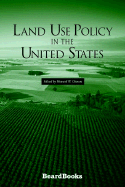|
|
|
|
||||||

|
Land Use Policy in the United States
By Howard W. Ottoson 2001/06 - Beard Books 1587980991 - Paperback - Reprint - 678 pp. US$34.95 A marvelous compendium of the course that United States land policy had taken over the past 180 years. Publisher Comments
In 1962, marking the one hundredth anniversary of the signing of the Homestead Act by President Lincoln, twenty nationally-known economists, historians, a political scientist, and a geographer were called upon to present papers at a symposium to appraise the course the United States land policy had taken over the past 180 years. The papers are compiled in this volume. Grouped into five major areas, they make engrossing and informed reading. From Turnarounds and Workouts, April 15, 2002 In 1962, marking the 100th anniversary of the signing of the Homestead Act by President Lincoln, 20 nationally recognized economists, historians, a political scientist, and a geographer presented papers at the Homestead Centennial Symposium at the University of Nebraska. Their task was to appraise the course that United States land policy had taken since independence. The resulting papers are presented in this book, grouped into five major areas: historical background; social factors influencing U.S. land policy; past, present and future demands for lands in the U.S.; control of land resources; and implications for future land policy. This book begins with a summary of the Homestead Act, its antecedents, the arguments of its supporters and detractors, and its intent versus implementation. The Act offered a quarter section (160 acres) of public land in the West to citizens and intended citizens for a $14 filing fee and an agreement to live on the land for five years. The program ended in 1935. Advocates claimed that frontier lad had no value to the government until it was developed and began generating tax revenue. Opponents feared the Act would lower land valued in the East and pushed for government sale of the land. In practice, states, territories, railroads and investors were able to set aside more land than was eventually handed over to the homesteaders. One paper deals with land policy before 1862. From the start, the U.S. required that "all grants of land by the federal government should embody a description of the land not merely in quality, but in place as defined by relation to an actual survey." This policy avoided countless boundary disputes so vexing to other countries. Perhaps most interesting are the social history chapters: Czechoslovakians pushing wheelbarrows across Nebraska, "Daughters and Sons of the Revolution…(living) next to…Mennonites," and "an illiterate…neighborly with a Greek and a Hebrew scholar from a colony of Russian Jews." Mail-order brides, "defectors from civilization," the importance of the Mason jar, the Jeffersonian dream of a nation of agrarian freeholders, and Santayana's observation that the typical American skitters between visionary idealism and crass materialism, all make for fascinating reading. The land-use policy problems discussed certainly haven't been solved today. And, although land use conflicts in the U.S. haven't always been resolved equitably, "the big step forward taken by the United States during the last one hundred and fifty years in the age-long struggle of man towards the ideals of mutuality and equity has been the working out of a system wherein the sovereign superior who prescribes the working-rules for land use and decision making have become, himself, a collective of the citizenry." A chapter is devoted to the arguments between the family farm ad the "sentiment against concentration of wealth in the hands of a few." The discussion of the Land Grant college system and its contribution to international development closes with a quote from Chester Bowles: "Can we, now the richest people on earth, become creative participants in the unprecedented revolutionary changes of our era, changes that the most privileged people will oppose tooth and nail, but which for the bulk of mankind offer the hopeful prospect of a little more food, a little more opportunity, a doctor for their sick child, and sense of personal dignity?"
|
||||||||||||||||||||||||||||||||||||||||||||||||||||||||||||||||||||||||||||||||||||||||||||||||||||||||||||||||||||||||||||||||||||||||||
|
|
|
home
| about us
| contact us
| related
sites |